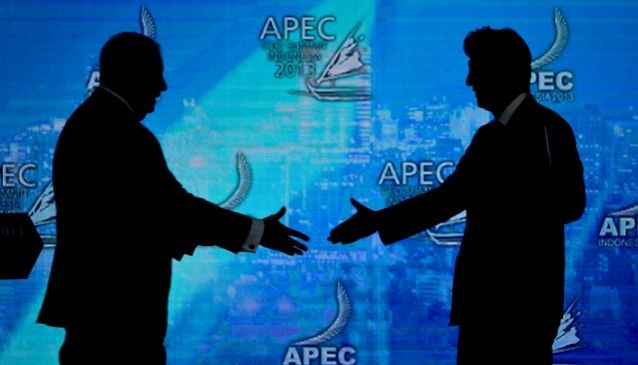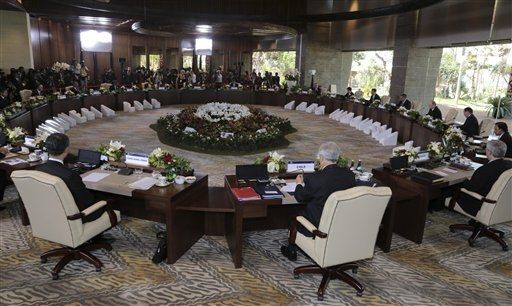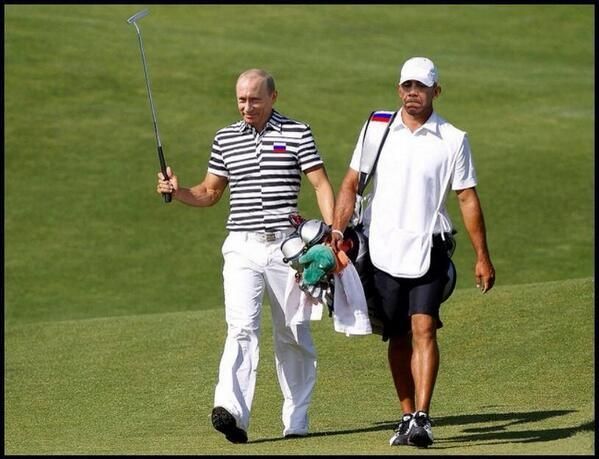Now Bali can get back to normal

For weeks Bali has been festooned with flags, banners and billboards bidding welcome to the delegates and reporters who came in for this conference, which we are informed is for the good of all Asia. For 4 days, Ngurah Rai Airport in Bali has been closed for up to 10 hours at a time, many flights cancelled, then some more delayed or cancelled (up to 700 flights) resulting in irate tourists whose only view of the deliberations was speeding limos and police cars with sirens blaring.
Battleships were stationed along the coast, military planes and helicopters covered Bali air space, and thousands of troops and specially trained police were placed at strategic points around Bali. Although most were within the Nusa Dua Complex on the south-east coast, ports like Gilimanuk and Padang Bay saw their fair share of uniformed personnel.
As the final round of meetings brought an end to the 21st APEC Economic Leaders Meeting held in Bali from 7th to 8th October 2013, which included 21 heads of state and 4 observer countries, Indonesian President S B Yudhoyono, Chair of the Summit Retreat, emerged around noon on Tuesday, 8th October, and informed the press that discussions among leaders proceeded smoothly and productively. APEC leaders’ deliberations centred on the theme of APEC 2013, being: “Resilient Asia-Pacific, Engine of Global Growth”.
The final outcome of year-long meetings among APEC officials and senior officials, and final meetings of APEC leaders in Bali, is that the Summit leaders have agreed and are committed to 7 Strategic Points, which are:
In line with this commitment, it was agreed to take further steps in empowering, engaging and opening opportunities for all stakeholders, to participate in the APEC process and gain benefits from it.

Leaders at APEC round table meeting
It was also agreed to ensure the success of the upcoming Ninth WTO Ministerial Conference in Bali in December 2013, disclosed the President.
Leaders shared the view that connectivity could help reduce production and transportation costs, strengthen regional supply-chain, and improve the business climate in the region. And at the same time, infrastructure and connectivity building will create more jobs and ensure job security.
Now that all these agreements and commitments are in place, members must show the world that APEC will continue to play a significant role in global economy.
At the end of his speech, President Yudhoyono expressed his heartfelt thanks to all the Leaders and delegations for their continued support during Indonesia’s APEC chairmanship.
He also thanked all who made the Bali APEC Summit a resounding success, the ABAC business delegations, the APEC Secretariat, and of course the Organizing Committee; and above all to the people of Bali for their extraordinary support and hospitality.
China to host APEC 2014
At the close of APEC 2013, Indonesia handed over the APEC chairmanship to China, host of APEC 2014. Next to Beijing, the administrative region of Hong Kong will also become host of the APEC Finance Ministers Meeting in September 2014.
The series of APEC Meetings in 2014 will cover the APEC CEO Summit, the APEC Business Advisory Council Forum (ABAC), the China-APEC, the APEC Forum for SMEs, the APEC Forum for Young Entrepreneurs, and the Discussion Forum between Ministers and the Business sector.
This year China sent the largest delegation to the Bali APEC Summit, totalling 200 persons from among the 1,200 CEOs attending the Conference. In accepting the chairmanship, the government of China ensured that hotel facilities and conference venues for next year’s meetings will be of international standard with the same high quality as provided by Indonesia in Bali.
Last year 2012, APEC was held in Russia Vladivostok.
What is APEC ?
APEC (the Asia-Pacific Economic Cooperation) was established in Canberra, Australia in 1989, and is aimed to strengthen economic growth and strengthen relations among international communities in the Asia-Pacific region. APEC membership focuses on economic regions rather than on country membership.
Today APEC has 21 economic members which include Hong Kong (China) and Taiwan. APEC members are: the United States of America, Australia, Brunei Darussalam, Chile, China, Hong Kong-China, Indonesia, Japan, South Korea, Malaysia, Mexico, Papua New Guinea, Peru, Russia, New Zealand, Singapore, Chinese Taiwan, Thailand and Vietnam. All members have coastlines facing the Pacific Ocean.
APEC works to build anti-protectionism measures among its members while reducing tariffs and eliminating drawbacks to free trade. There are no written agreements to be signed during APEC since members are bound through consensus while cooperation is based on the Bogor Goals that were agreed upon in 1994. In it was agreed that the forum was formed to create free and open trade to increase foreign investment in member countries, in the year 2010 for economic advanced countries, and in 2020 for emerging economies.
The existence of APEC as an increasingly significant global economic power, continues to be recognized throughout the world.
http://www.indonesia.travel via eturboNews

Thanks for Birthday Wishes - Not in Bali and not who you think